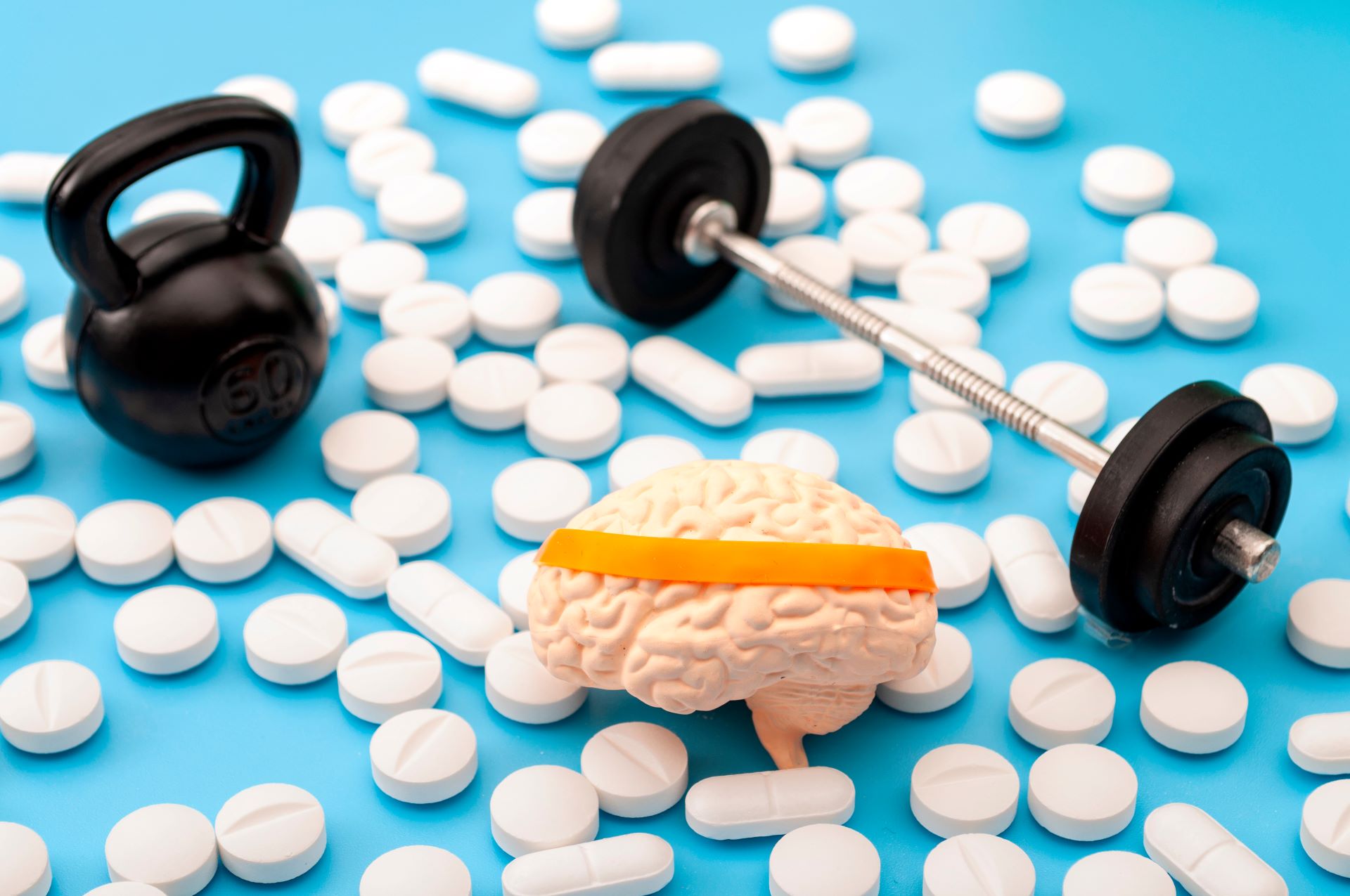Nootropic Supplements For ADHD: Can It Actually Help?

Attention-Deficit/Hyperactivity Disorder (ADHD) is a neurodevelopmental disorder that impacts millions of children and adults worldwide. The condition can manifest in various ways, including difficulty maintaining focus, impulsivity, and hyperactivity, affecting daily life and overall well-being.
Traditional treatments for ADHD frequently rely on prescription medications. While these medications are effective for some, they are not universally well-tolerated due to potential side effects such as insomnia, loss of appetite, or anxiety. Given these limitations, nootropic supplements are increasingly considered a potential alternative or adjunctive treatment for ADHD.
Nootropics are substances designed to enhance cognitive function. With an increase in the prevalence of ADHD diagnoses and a growing market for cognitive enhancers, the relevance of nootropic supplements for ADHD has become a subject of intense discussion and research.
What Are Nootropics?
Nootropics, also known as 'smart drugs,' are substances that improve cognitive functions such as focus, memory, and creativity. Unlike prescription medications specifically formulated to treat ADHD, nootropics are generally marketed to the general population. Many are available over the counter, making them more accessible and less regulated.
Common ingredients in nootropic supplements include amino acids, antioxidants, and other compounds like L-theanine, Bacopa Monnieri, and Rhodiola Rosea. While these substances may have some cognitive-enhancing effects, it's crucial to understand that they are not medications specifically tailored for ADHD treatment.
The field of nootropics has seen rapid growth in recent years. However, research on their long-term effects and efficacy is relatively scant. Given that ADHD is a complex condition often requiring multi-faceted treatment, the benefits and risks of using nootropics must be thoroughly understood.
The Science Behind Nootropics And ADHD
The underlying neurobiology of ADHD is intricate and still a subject of ongoing research. One prevailing theory suggests that imbalances in neurotransmitters—chemical messengers in the brain—are a significant factor in ADHD symptoms.
Traditional prescription medications like Adderall and Ritalin focus on modulating these neurotransmitters, particularly dopamine and norepinephrine, to bring them into a more balanced state, which in turn helps to manage symptoms like inattention and hyperactivity.
Although the mechanisms may differ, nootropics also put forth claims of affecting neurotransmitter activity. Take L-tyrosine, for example; this amino acid serves as a precursor to dopamine, meaning it provides the necessary building blocks for the neurotransmitter to be synthesized in the brain. By providing more of this precursor, dopamine levels may be optimized, potentially improving focus and attention.
However, it's crucial to differentiate between the robust clinical testing that traditional ADHD medications undergo and the limited scientific scrutiny applied to nootropics. The former are subject to rigorous trials that establish their safety and efficacy. Despite some promising initial studies, the latter is usually not held to the same stringent standards due to their classification as supplements.
Benefits Of Using Nootropics For ADHD
The appeal of nootropic supplements as a treatment for ADHD lies in their potential advantages over traditional medications. While the scientific backing is still in its infancy, some reported benefits could make nootropics an attractive option for individuals seeking alternative treatments. Here is a list summarizing some of these key benefits.
- Fewer Side Effects
Traditional ADHD medications, especially stimulants, are known to cause a range of side effects like insomnia and loss of appetite. Nootropics, on the other hand, are generally believed to have fewer adverse effects. However, this notion is mostly based on anecdotal evidence and short-term studies.
- Over-The-Counter Availability
Unlike prescription medications for ADHD, many nootropics can be bought without a doctor's prescription. This accessibility makes it easier for individuals to try them out without going through a lengthy medical consultation process. However, this ease of access should not replace professional medical advice.
- Potential For Personalization
The nootropic market is diverse, offering various supplements that claim to enhance different cognitive functions. This variety allows individuals to tailor their regimen to target specific ADHD symptoms they experience. Despite the flexibility, personalized treatment should be planned with a healthcare provider for optimal effectiveness.
- Cognitive Enhancements
Some nootropics offer broader cognitive benefits like improved memory and mental clarity, which go beyond treating ADHD symptoms. These broader cognitive enhancements could serve as a multi-pronged approach to managing ADHD and improving overall cognitive health. Again, long-term studies are needed to substantiate these claims.
- Flexibility In Dosage
Nootropics often come in various dosages and formats, allowing for more individual control over treatment. This flexibility can be particularly advantageous for people who are sensitive to medications or who require a more tailored approach. Nonetheless, flexibility should not equate to self-experimentation without professional guidance.
It's important to note that until more extensive research is available, the advantages should be considered with caution.

Risks And Concerns
While nootropics offer potential benefits, it's crucial to be aware of the potential downsides before incorporating them into any treatment plan for ADHD. Here's a list that encapsulates some of the key risks and concerns.
- Lack Of Regulation
Because nootropics are often categorized as dietary supplements, they aren't subject to the stringent testing that prescription medications undergo. This oversight can lead to inconsistent quality and potency between different brands or even individual batches. Consumers must exercise extra caution, particularly when choosing products without third-party testing.
- Variable Quality
The unregulated nature of the nootropics market means that quality can vary widely from one product to another. Inconsistencies in ingredient purity and dosage can affect not only the efficacy of the product but also its safety. Thus, it's crucial to purchase from reputable sources that provide third-party testing.
- Insufficient Scientific Evidence
While there is some initial research and anecdotal evidence supporting the use of nootropics for ADHD, the scientific consensus is still inconclusive. Small sample sizes and the absence of long-term studies make it difficult to gauge true efficacy and safety. Caution and consultation with healthcare professionals are advised before starting any nootropic regimen for ADHD.
- Potential For Adverse Interactions
Nootropics could interact with other medications or pre-existing conditions, which may result in unforeseen side effects. These interactions are not well-studied, making them a potential risk factor. Consulting a healthcare provider is essential, especially if you are already on other medications or treatments.
- Unknown Long-term Effects
While some nootropics have been deemed safe for short-term use, the long-term consequences remain largely unknown. The lack of longitudinal studies makes it challenging to predict how prolonged use might affect an individual, especially in the context of ADHD. This unknown variable should make both healthcare providers and patients cautious about long-term use.
Understanding these risks and concerns is vital for making an informed decision about using nootropics as a treatment for ADHD. Consultation with a healthcare provider is strongly advised to navigate these potential pitfalls and to assess whether nootropics are a suitable treatment option for your specific needs.
Individual Differences And Personalization
ADHD manifests in a multitude of ways, and its heterogeneity often necessitates a personalized approach to treatment. Symptoms and severity differ from person to person, as do the side effects and effectiveness of various treatment modalities.
For some, traditional medications like stimulants or non-stimulants may be effective, while others may find these options unsatisfactory due to side effects or limited efficacy, leading them to explore alternatives such as nootropics.
However, it's essential to note that the efficacy of nootropics varies among individuals due to a range of factors. In such cases, genotyping or even full genomic sequencing could offer valuable insights into which substances are most likely to be beneficial or harmful to a specific individual.
Secondly, co-existing conditions can dramatically affect the effectiveness of nootropics in treating ADHD. Conditions such as anxiety, depression, or other mood disorders often co-occur with ADHD and may require a more nuanced approach to treatment. For example, a nootropic that increases alertness may exacerbate anxiety symptoms and thus be contraindicated in individuals with co-existing anxiety disorders.
Lifestyle factors, such as diet, exercise, and sleep patterns, also play a crucial role. Some nootropics may interact with nutrients or other bioactive compounds in food. Others might have their effects amplified or diminished by exercise. Sleep deprivation, a common issue among people with ADHD, can also alter the efficacy of nootropic interventions.
Therefore, personalization becomes crucial in optimizing therapeutic outcomes for ADHD treatment using nootropics. Continuous monitoring, through symptom-tracking apps or regular check-ins with healthcare providers, can help fine-tune the regimen and make necessary adjustments over time.
Where To Start?
For those interested in exploring nootropics as a potential treatment for ADHD, the first step should always be to consult with a healthcare provider. While nootropics may appear to be an easy and convenient option, medical guidance is crucial for ensuring that they are suitable and safe for your specific needs.
Once you've consulted a healthcare provider, starting with a single-ingredient nootropic supplement might be beneficial to monitor its effects. Some users opt for 'stacks,' which are combinations of multiple nootropics, but it's advisable to understand how each component affects you individually before combining them.
Always consider the source when purchasing nootropic supplements. Look for companies that offer third-party testing to ensure the quality and potency of their products. This extra step can help provide some level of assurance in an otherwise unregulated market.
Conclusion
Nootropic supplements have gained attention as a potential alternative or supplementary treatment for ADHD, driven by their promises of enhanced cognitive function with fewer side effects.
While some initial research and anecdotal evidence suggest possible benefits, the scientific community has yet to reach a consensus on their efficacy and safety for treating ADHD. Given the complexity of the disorder and the lack of long-term research on nootropics, it's imperative to approach this treatment option cautiously and always consult a healthcare provider.